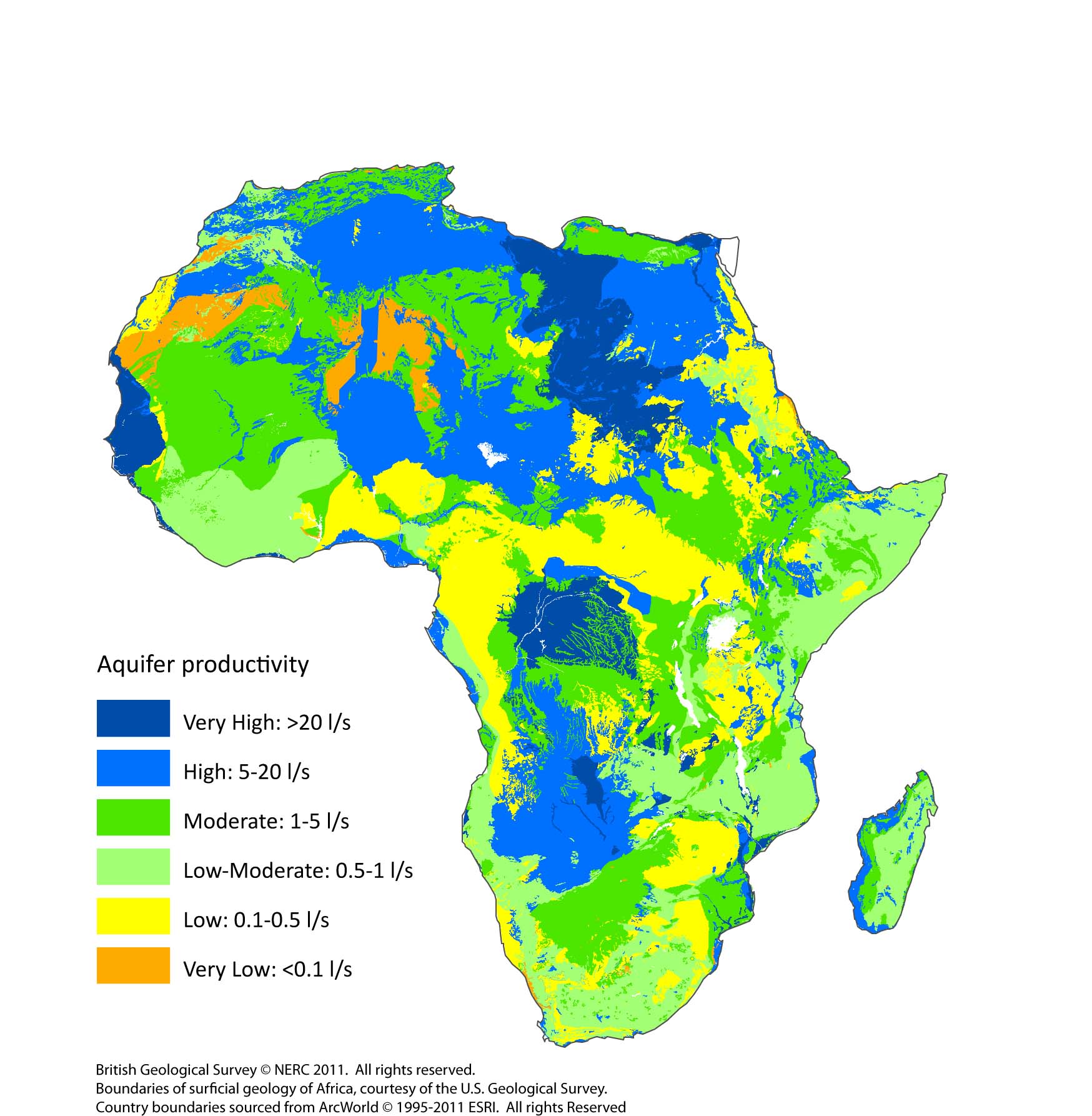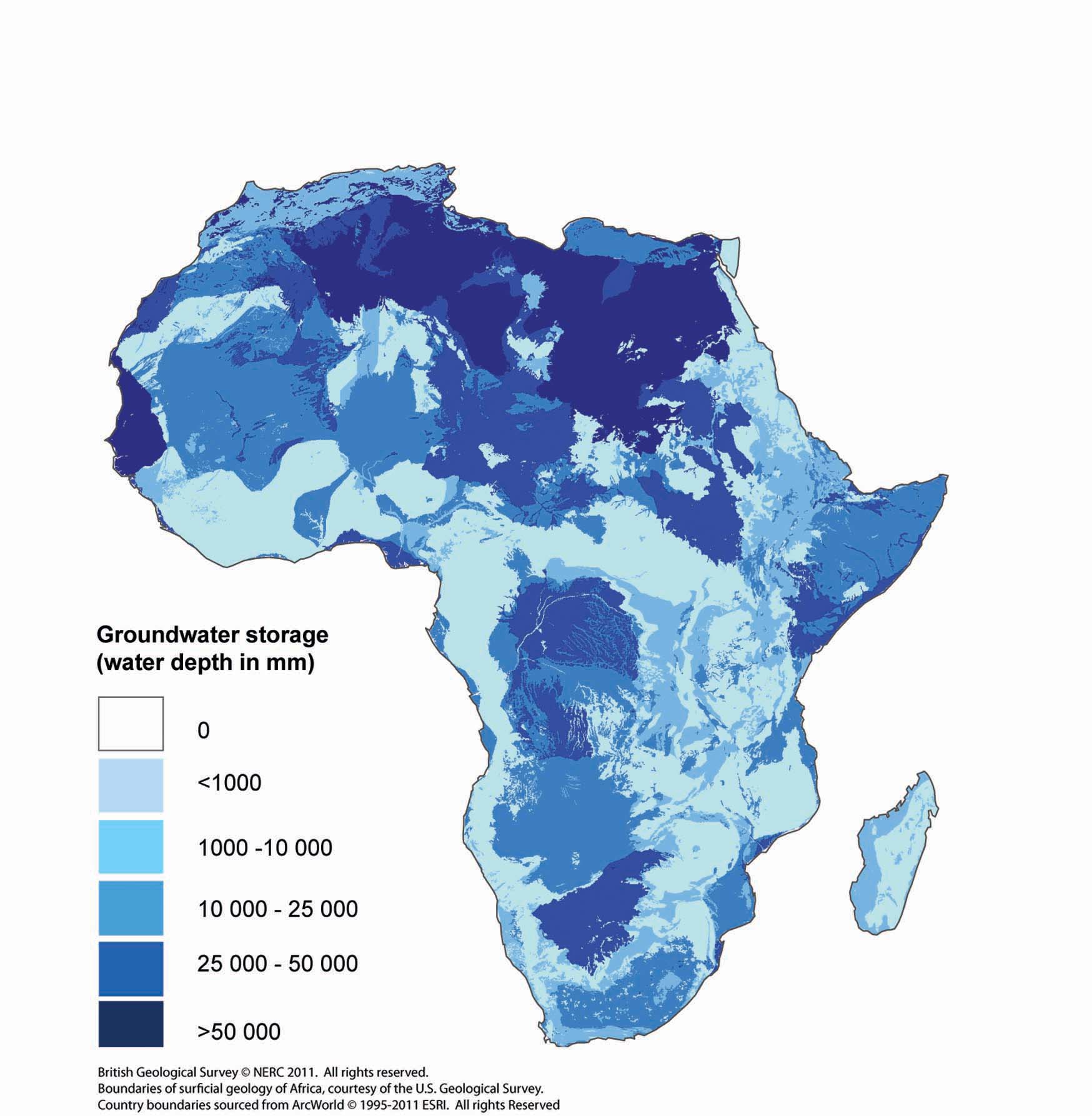Aqua and Authority: Tracing the Tides of Water Politics in Africa
From the maps below we could see the abundance of water resources in the well-known Sahara desert, many of you may think: Sahara has this much water? The truth is, 11,000-5000 years ago, Sahara was covered in vegetation and lake. The depth of groundwater storage is at peak greater than 50,000. Africa has water, but the problem is access, which is also Sustainable Development Goal 6: Clean Water and Sanitation. Water means life and growth (Gonzalez and Yanes, 2015), so does politics. Water is a vital being that we all need. This signifies the importance of water and why people, villages, tribes, countries fight for it (Masiangoako et al., 2022). The claim and governance of water resource increases tension between countries, where tension builds up to a geopolitical event in the great Nile river.
 |
| Figure 2. Groundwater productivity map (BGS, 2011) |
 |
| Figure 1. Groundwater storage map (BGS, 2011) |
Whispers of the Nile: Unveiling the Water-Politics Nexus
The Nile, one of the world's longest rivers, has historically been a symbol of sustenance, civilisation and life. However, in recent years, it has morphed into a crucible of contention among the nations it flows through, symbolising their intricate relationship between water and politics in Africa. The Nile Basin is home to 487.3 million people and currently witnessing a geopolitical tussle which has broader implications for regional stability.
This dispute between Egypt and Ethiopia over Nile waters is more than a mere political squabble. It highlights human ecology that 'the social is embedded in the ecological' (Ostrom, 2015). At the heart of this discord is a natural resource - water. Just like many African countries, Ethiopia faces challenges of erratic rain patterns due to global warming. This creates uncertainty, and a solution to an unpredictability is certainty. The construction of dam to protect the human ecology for dryer seasons is inevitable. Not only does it helps store water but also hydroelectricity generation for the benefit of people. The Grand Ethiopian Renaissance Dam (GERD) places Ethiopia on a higher political ground especially among its unwilling neighbours Egypt and Sudan (Elsanabary and Ahmed, 2018). On a local perspective, a human rights lawyer and water expert Ahmed al-Mufti believes that the dam 'will cause a water war' (The Guardian, 2020).
 |
| Figure 3. Grand Ethiopian Renaissance Dam (France 24) |
However, global warming and geopolitical tension is not built up in days, but for centuries long. Especially the political tension among water between African countries where it heightened in colonial periods. I will delve deeper into the historical context, water management, and international cooperation of in the coming blogs along with many other case studies to elaborate the concept of water and politics in Africa and come up with possible governance advices on water management for countries.

Hi David! I really enjoyed this blog post and am excited to see what you explore next. You mentioned tension between countries building over centuries, do you believe climate change will just be another factor which causes disagreements over water management, just adding to tensions? Or do you think water will lead to wars in the near future?
ReplyDeleteThank you Beth! Climate change may intensify water management tensions, potentially adding to existing disputes. However, whether this leads to wars depends on diplomatic efforts and international cooperation. Proactive and collaborative water resource management is key to preventing conflicts.
DeleteHi David this is a really good blog post on that sets out the ideas for the rest of your blog series. In terms of the GERD and the conflicts that are currently ongoing what would you suggest is the best solution for making this project as efficient as possible?
ReplyDeleteThank you Kyon! To efficiently address the GERD conflict, it's crucial to foster open dialogue among Ethiopia, Egypt, and Sudan, involve neutral international mediators, establish a legal and technical framework for water sharing and dam operation, and invest in regional water management projects. Cooperation and commitment to mutual benefit are key.
DeleteThe picture of Africa easily make me understand the geo-fact of Africa, and the introduce of political situation in Africa make this Blog more interesting and attractive !
ReplyDeleteThank you for your feedback! I'm glad the visual representation of Africa's geographical features was helpful in understanding the context. Incorporating the political landscape into the discussion is essential to fully grasp how it influences environmental and water management issues. It's great to hear that this approach made the blog more engaging and informative for you!
Delete